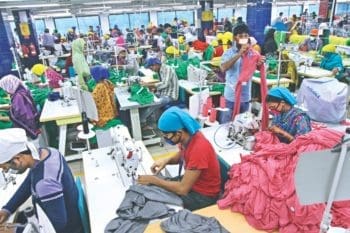Fifty-nine garment factories closed and 25,900 workers lost their jobs in the last seven months, according to Bangladesh Garment Manufacturers and Exporters Association (BGMEA) president Rubana Huq, who said most of these were small and medium enterprises that failed to strictly maintain compliance strictly and pay their workers under the new wage structure.
Bangladesh’s apparel export has declined in recent months whereas its competitors have seen a rise in the field, she said. In the first quarter of the current fiscal, garment export from Bangladesh dropped 1.64 per cent year-on-year to $8.05 billion when earnings from the sector fell 11.52 per cent short of the quarter’s target of $9.10 billion. On the other hand, garment shipment from Vietnam increased by 10.54 per cent between July and September. It was 2.2 per cent for India and 4.74 per cent for Pakistan.
“The inflow of investment in the garment sector is also slow both in terms of new entrepreneurship and expansion as the buyers are not paying good prices,” Rubana told journalists. Buyers are now trying to cash in on the presence of an unhealthy price competition among the local garment makers and less production of value-added items in Bangladesh, Bangla media reports quoted her as saying. “We think the sector will continue to show negative growth in the coming months. At the end of this fiscal year, we may lose our second position to Vietnam in the global apparel market, if we cannot turn around soon from this declining trend,” she said. Poor product diversification, rising online businesses, closure of retail outlets in the western world, and a 1.2 per cent fall in global apparel consumption as predicted by the World Trade Organisation (WTO) are primarily responsible for the declining trend in Bangladesh, Rubana said.
Moreover, Bangladesh is more dependent on cotton fibre whereas the demand for the garment items made from the man-made fibre is increasing worldwide. The BGMEA chief said small and medium-sized factories are getting closed due to a lack of assistance from banks. BGMEA’s analysis showed that garment export declined 17.68 per cent year-on-year to $572 million in the first quarter while prices increased only by 2.54 per cent. On the US-China trade war, Rubana said Bangladesh is yet to benefit from the global dispute, while others are using it on the back of their diversified products. On the other hand, Bangladesh is losing its basic garment business and Vietnam, Myanmar, and Ethiopia are getting those work orders now. BGMEA has submitted a set of proposals to the Bangladesh Bank for the revival of the garment sector, she added. The BGMEA demanded the government devalue the local currency by Tk 2, implementation of which will cost the country nearly Tk 1,850 crore. It also called for 1 per cent incentive on exports with immediate effect, retrospective effect of 0.25 per cent source tax from July, doubling the loan rescheduling period for the existing 133 sick garment factories, and fund allocation for modernisation and tech upgrade of factories.
The association will soon meet with the government high-ups to place its demands, Rubana said.

